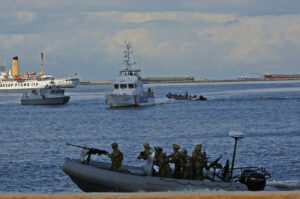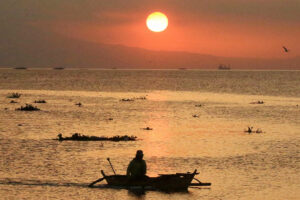Maritime cooperation in solidarity with our likeminded partners

It would be an understatement to say that the world we now live in is both challenging and uncertain. In the Indo-Pacific region alone, which accounts for more than 65% of global Gross Domestic Product (GDP) and through which waters half of all global trade passes, defense and security issues abound.
On Aug. 5, for instance, the Chinese Coast Guard used water cannons on Philippine boats which were on a resupply mission to the BRP Sierra Madre off Ayungin Shoal, very clearly a part of the Philippines’ Exclusive Economic Zone. The incident was widely condemned not only by Filipinos but by other countries. This reaction, however, has not stopped China from continuing its aggressive acts in the same area this week.
And then, on Aug. 28, the Chinese also released its so-called new “standard” map, claiming the existence of not nine but 10 dash lines, including parts of Taiwan and India. Again, there was widespread rejection of this audacious act, but such have never stopped China’s expansionist claims.
These developments are just some of the more recent examples of gray zone activities in the Indo-Pacific region by the Chinese, which are threatening and hegemonic even as they do not quite technically qualify as armed attacks. Whatever the definition, they very clearly display China’s intent to claim what is not its own, to undermine the rules-based international order, and to position itself as the next great power to be reckoned with, by any means necessary.
Fortunately, amid the traditional, non-traditional, and evolving risks that are present in the region, like-minded states are finding the opportunity to work more closely together, driven by their shared values and commitment to the rule of law. The Philippines is right in the middle of these alliances and partnerships — a reassuring place to be, given the difficulties now besetting the region.
Just last week, we were part of two key, top-level meetings: the ASEAN summit, and the East Asia summit, both held in Jakarta, Indonesia. On Sept. 5, President Ferdinand Marcos, Jr. said, “We must emphasize that practical cooperation in the maritime domain can only flourish with an enabling environment of regional peace, security, and stability, anchored in international law.” He did this as he pushed for the crafting and finalization of the Code of Conduct in the South China Sea. Unfortunately, the ASEAN Chairman’s statement did not contain any mention of China’s new map.
President Marcos Jr., in his interventions during the ASEAN meetings with other countries during the East Asia Summit, always invoked the value of maritime cooperation in maintaining peace and stability in the Indo-Pacific region.
PHILIPPINE-AUSTRALIA RELATIONSAnother milestone took place last week, as well — the elevation of Philippine-Australia relations into a Strategic Partnership. This coincided with the visit of Australian Prime Minister Anthony Albanese to Manila.
The strategic partnership reflects the growing relationship between the two countries, which have had diplomatic ties for the last 77 years and is a testament of the increasing geopolitical value of the Philippines in the region. This is a natural progression of our deep ties with Australia, which has consistently been among the countries most trusted by Filipinos.
Australia has been one of the most vocal and supportive of the Philippines’ arbitral victory in 2016. Its commitment in the region was tangibly felt last month during the conduct of joint military exercises with the Philippines called Exercise Alon, which aimed to strengthen external defense and interoperability. Outside of the defense realm, trade activities also form a crucial aspect of the strategic partnership, as Australia’s Southeast Asia Economic Strategy to 2040 includes cooperation with the Philippines.
INDIA AS ALLYIn July, during the 7th anniversary of our arbitral victory in the West Philippine Sea, the Indian Ambassador to the Philippines, His Excellency Shambu Kumaran, said all countries “have an obligation to respect international law, but bigger countries have a larger obligation to respect international law.”
We are also happy to have India as a valuable ally in our maritime initiatives. Both our countries acknowledge the critical role of the maritime sector, as well as its growing importance in the regional space.
Then again, maritime cooperation is not limited to defense and security in our seas. Not only do we share common values and commitments with India. More tangibly, we share common interests and increased cooperation on hydrography. Philippine and Indian leaders have acknowledged the utility of maritime domain awareness and have called for the early operationalization of the Standard Operating Procedure for the White Shipping Agreement between the Indian Navy and the Philippine Coast Guard. Maritime economies, and even the care of the marine environment, are also important aspects of cooperation, necessary for a flourishing Indo-Pacific region.
Thus, the Stratbase ADR Institute is happy to have hosted a forum this week as part of the Track 2 dialogues with India, where we talked about security, the sustainable development of the blue economy, shipbuilding industries, seafarer training, and the law of the sea from both the Philippine and Indian perspectives.
As long as the Philippines has its allies, friends, and partners who are equally devoted to upholding the rule of law and common decency, we will never be disheartened by the acts of coercive states. If at all, they only serve to intensify our will and commitment to forge meaningful alliances with like-minded states in preserving peace and stability in the Indo-Pacific.
Victor Andres “Dindo” C. Manhit is the president of the Stratbase ADR Institute.




